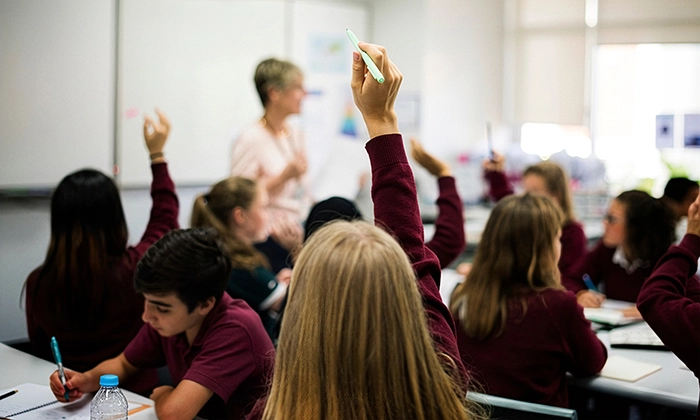The flipped classroom: Explained

Chapter 1: The Fantasy Classroom
Imagine you walk into the classroom at the start of the lesson, you stand in front of the class and the students shoot their hands up. You haven’t said a word. Not even mentioned the words differentiation or Hamlet.
Your students start asking you questions. Questions ranging from simple misunderstandings, to complex concepts despite never being taught them in class.
After answering all of these questions, you hand out a homework sheet. But the students don’t leave. Instead, they begin to work through the problems. For the next 45 minutes, you walk around the classroom, answering questions, helping your students blast through roadblocks and all the while sipping a hot cup of Joe.
You finally reach the student who you can tell is struggling, but never quite get the opportunity to talk to. Maybe that day you just help them with one question…or maybe that day you make a breakthrough.
Over the next few weeks, you notice your students aren’t simply sitting quietly and (partially) listening, but they’re becoming deeper thinkers and actually participating in discussion. They not only do better in exams but they work together to solve problems. You as a teacher change from a static lecturer, to a guide, a mentor and a coach.
It sounds like some sort of teacher fantasy classroom right?
Chapter 2: Reality
Well unbelievably, these are some of the experiences Jonathan Bergmann and Aaron Sams, two high school teachers turned educational pioneers discovered when they flipped their classrooms. After both receiving the Presidential Award for Excellence in Math and Science Teaching in 2002 and 2009 respectively, Bergmann and Sams have now co-founded The Flipped Learning Network, speak internationally about education and have published 7 books on the topic.
Chapter 3: What exactly is a “flipped classroom?”
The flipped classroom model is a new education strategy that inverts traditional teaching methods by delivering lectures or instructions outside of class through an online platform for homework.
The time freed from not having to give lectures in class is then reapplied by stepping the students through work they would normally be doing as homework. This allows students to work collaboratively, actively learn and engage with applying their knowledge. For the teacher, this frees up time to focus on students individually, being able to support those who need it the most and experiment with different learning methods all within the same class timetable.

Picture Credit: Knewton Infographics
So what do we have to do with it?
Atomi is essentially a platform that enables the flipped classroom, without costing hours and hours of work by the teacher to produce content. We make entertaining, engaging syllabus based videos that students are easily able to access at home. The secret is producing content that students actually want to watch and that does a good job of simply and effectively communicating concepts. This means that flipping the classroom is the easiest it’s ever been.
That fantasy classroom could be all yours; all you have to do is flip.
References
Subscribe to our newsletter
Get the latest teaching and learning insights delivered to your inbox.
You can unsubscribe at any time, no hard feelings.
Subscribe to our newsletter
Get the latest teaching and learning insights delivered to your inbox.
You can unsubscribe at any time, no hard feelings.
What's Atomi?
Easy to understand, super engaging, and matching what you’re learning in class. Available for 100s of subjects across your high school years.
With heaps of questions and smart AI feedback that shows you what you’ve nailed and what to work on—so you won’t just feel ready, you’ll be ready.
Improve your study game, get AI-driven tips tailored to you, keep tabs on your progress and unlock insights so you can always hit your goals.
What's Atomi?
Captivating and impactful video-first content, fit for all types of learners and grounded in the absolute must-have info of the high school curriculum.
Active recall quizzes, topic tests and exam practice enable students to get immediate feedback and build skills, while allowing teachers to differentiate instruction.
Create engaging learning experiences with easy-to-use tasks, get actionable insights to differentiate instruction and experience intelligent personalisation for your students.
What's Atomi?
Short, curriculum-specific videos and interactive content that’s easy to understand and backed by the latest research.
Active recall quizzes and practice sessions enable students to build their skills, put knowledge into practice and get feedback.
Our AI understands each student's progress and makes intelligent recommendations based on their strengths and weaknesses.




